|
|
|
Sort Order |
|
|
|
Items / Page
|
|
|
|
|
|
|
| Srl | Item |
| 1 |
ID:
155825
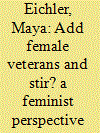

|
|
|
|
|
| Summary/Abstract |
This article examines how scholarship on veterans has begun to incorporate gender as a relevant category of research. Drawing on feminist theory, it identifies different approaches to gender within the field of veterans studies and suggests avenues for advancing this aspect of research. The vast majority of gender research on veterans treats gender as a descriptive category or variable through a focus on female veterans or gender differences. This article argues that research on veterans can be enriched by employing gender as an analytical category. Focusing on gender norms, power and inequality based on gender, and the intersections of gender with other categories of social difference opens up new questions for gender research on veterans. This kind of broader, analytical conceptualization of gender reveals the ways in which gender shapes the transition to civilian life for all veterans and how veterans policies and programs impact gender relations.
|
|
|
|
|
|
|
|
|
|
|
|
|
|
|
|
| 2 |
ID:
145150
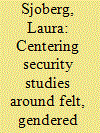

|
|
|
|
|
| Summary/Abstract |
This article draws on two decades of work in feminist security studies, which has argued that gender is necessary, conceptually, for understanding the concepts of war and security; important, empirically, for analyzing causes and predicting outcomes in the field of security; and essential to finding solutions to insecurity in global politics. The work of feminist security studies suggests that one of the most persistent features of the global political arena is gender hierarchy, which plays a role in defining and distributing security. The argument in this article moves from talking about the security of gender to discussing the gendered sources of insecurity across global politics. It then builds on existing work in Feminist Security Studies to suggest a felt, sensed, and experiential notion of the security/insecurity dichotomy as a new way to think about global security (studies). A (feminist) view of “security as felt” could transform the shape of a number of research programs in security studies.
|
|
|
|
|
|
|
|
|
|
|
|
|
|
|
|
| 3 |
ID:
124459
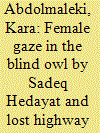

|
|
|
|
|
| Publication |
2013.
|
| Summary/Abstract |
In feminist theory, the "female gaze" is a reaction to the imbalance of power created by the "male gaze". Yet, since the concept lacks sound grounding in theory, it solely poses "a simple (antagonistic) response" to male voyeurism. This article traces the manifestations of the female gaze in Lost Highway and The Blind Owl, a film noir and a novella. It is concluded that instead of offsetting the imbalance of power, the female gaze only reverses it, turning the concept into yet another catchphrase of patriarchal hegemony to further commodify and subjugate women.
|
|
|
|
|
|
|
|
|
|
|
|
|
|
|
|
| 4 |
ID:
101842
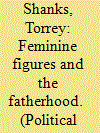

|
|
|
|
|
| Publication |
2011.
|
| Summary/Abstract |
Traditionally neglected, Locke's First Treatise of Government has taken on new significance with feminist interpretations that recognize the importance of its sustained engagement with patriarchal power. Yet feminist interpreters, both critics and admirers alike, read Locke as a champion of the "man of reason," a figure seemingly immune to the influences of passions, imagination, and rhetoric. These interpreters wrongly overlook Locke's extended engagement with the power of rhetoric in the First Treatise, an engagement that troubles the clear opposition of masculine reason and its feminine exclusions. Taking Locke's rhetoric seriously, I argue, makes the First Treatise newly important for what it shows us about Locke's practice of political critique. In following the varied and novel effects of Locke's feminine figures, we find a practice of political critique that depends on a mutually constitutive relation between rhetoric and reason.
|
|
|
|
|
|
|
|
|
|
|
|
|
|
|
|
| 5 |
ID:
088847
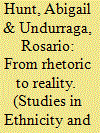

|
|
|
|
|
| Publication |
2009.
|
| Summary/Abstract |
This paper provides an overview of the current situation of Kosovo using a gendered perspective to highlight the challenges posed to the implementation of the National Action Plan for the Achievement of Gender Equality in Kosovo (NAP). The NAP arose through collaboration between the United Nations Development Fund for Women (UNIFEM) and the Kosovan women's movement and as such reflects both local and international gender knowledge and expertise. However, the current socio-political climate in Kosovo and its history of ethnic/religious conflict create significant difficulties that hinder the implementation of the NAP throughout all sections of society, and the subsequent achievement of gender equality. With this in mind, a contextualised assessment and discussion of the NAP is presented using feminist theory. Central to this is the recommendation that the incorporation of concrete steps stipulating how to achieve certain NAP objectives would contribute towards the successful achievement of gender equality in Kosovo.
|
|
|
|
|
|
|
|
|
|
|
|
|
|
|
|
| 6 |
ID:
093251
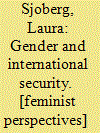

|
|
|
|
|
| Publication |
London, Routledge, 2010.
|
| Description |
xvii, 284p.
|
| Standard Number |
9780415475464
|
|
|
|
|
|
|
|
|
|
|
|
Copies: C:1/I:0,R:0,Q:0
Circulation
| Accession# | Call# | Current Location | Status | Policy | Location |
| 054655 | 355.03300082/SJO 054655 | Main | On Shelf | General | |
|
|
|
|
| 7 |
ID:
093779
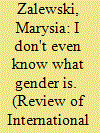

|
|
|
|
|
| Publication |
2010.
|
| Summary/Abstract |
In this article I discuss some of the connections between gender, gender mainstreaming and feminist theory. As a global initiative, gender mainstreaming is now well established; but the role of feminism and feminists in achieving this success is questionable. Some, including Harvard Law Professor Janet Halley claim that feminists, particularly in the realm of governance feminism, have been extremely successful. Yet despite this success Halley invites us to 'take a break from feminism'. I consider this political and intellectual invitation in this article in order to shed some light on the relationship between gender mainstreaming and feminism but also to probe what Robyn Wiegman refers to as a 'critical incomprehension' around feminism. My discussion includes a brief analysis of the imagery used in documentation relating to the United Kingdom's Gender Equality Duty Legislation; the latter a contemporary example of a legislative attempt to properly mainstream gender. In conclusion I return to the Halley's invitation to 'take a break from feminism' and introduce, by way of contrast, Angela McRobbie's recent discussion of post-feminism ultimately suggesting that we might see Halley's call, as well as the popularity (and 'failures') of gender mainstreaming as examples of post-feminist practice.
|
|
|
|
|
|
|
|
|
|
|
|
|
|
|
|
| 8 |
ID:
084000
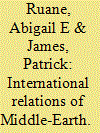

|
|
|
|
|
| Publication |
2008.
|
| Summary/Abstract |
This article demonstrates how by using J.R.R. Tolkien's Lord of the Rings (LOTR) as a text in the classroom instructors can relay the international relations (IR) "Great Debates" and feminist "waves" to students through the framework of "where you stand depends on where you sit." It overviews how J.R.R. Tolkien's acclaimed trilogy is relevant to learning about IR and then presents a number of "cuts" into using LOTR to inform IR teaching of both problem solving and critical theory. It begins by parsing the three "Great Debates" of IR theory and three "waves" of feminist theory in terms of different worldviews by relating them to characters from the trilogy. Next, the paper suggests that a critical evaluation of this analysis conveys that concerns, goals, and understandings of problems and insecurities are influenced (although not determined) by context, such as gender, race, class, sexuality, and postcolonial position. It concludes by suggesting that further use of popular culture and the humanities can help IR teaching both illustrate and critically reflect on IR scholarship.
|
|
|
|
|
|
|
|
|
|
|
|
|
|
|
|
| 9 |
ID:
193146
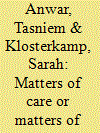

|
|
|
|
|
| Summary/Abstract |
International treaties and European directives have put new legal responsibilities on EU member states to pre-emptively monitor and prosecute terrorist activities and offences. In particular, the prosecution of terrorism financing has been an important focus to prevent material and ideological support for terrorist organisations. Yet, a clear distinction between humanitarian aid and terrorism financing in a complex war zone is not always easy to draw: Which of the involved parties is perceived as a terrorist threat, and what is exactly considered humanitarian aid work? In this paper, we empirically unpack how EU counter-terrorism laws and policies are actually practiced during court trials. We investigate the legal distinction between humanitarian aid and terrorism financing in Syria, specifically centring on trials from the Netherlands and Germany. Drawing on the growing debates in critical security and legal studies on materiality, we focus on how materials presented during trials such as baby products, weapons, and money, are inscribed with a particular security logic to reach a legal verdict. Introducing the concept of “matters of care/security”, we connect these debates and findings to insights from feminist and post-colonial studies to critically inquire how racialised and gendered assumptions on terrorist threat impact terrorism trials.
|
|
|
|
|
|
|
|
|
|
|
|
|
|
|
|
| 10 |
ID:
120708


|
|
|
|
|
| Publication |
2013.
|
| Summary/Abstract |
This article analyses the continued denial of equality to women in India's religious personal laws by focusing on the rights of brothers and sisters to illustrate the repeated failures of law. Although this failure has been normalised by deploying various conceptual tools, these theoretical trends need to be challenged. This article examines the 2005 amendment to the Hindu Succession Act which, although giving women extensive property rights, still gave sisters lesser rights than their brothers. It demonstrates that the concept of religious personal laws is a construct which is often used uncritically, and that it legitimises the denial of equal rights to women. The paper combines critical geography scholarship and legal feminist insights to argue that the law must be aware of spatial practices and that it is essential for legal thinkers to engage with the law in more than an instrumental sense. It analyses the processes of knowledge production and explores how the constitutive aspects of legal knowledge can be better integrated into legal scholarship. It thus aims to make visible the many spaces of the law: where laws are made; where ideas about men and women as owners of property are normalised; and where the law is expected to be implemented. It argues for legal scholars to be present and engaged in the contestation of meanings of the law.
|
|
|
|
|
|
|
|
|
|
|
|
|
|
|
|
| 11 |
ID:
168875
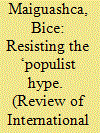

|
|
|
|
|
| Summary/Abstract |
The purpose of this article is to offer a feminist critique of populism, not as a distinct mode of politics, but as an analytical and political concept. As such, it seeks to redirect our attention away from populism, understood as a politics ‘out there’, towards the academic theoretical debates that have given this analytical term a new lease of life and propelled it beyond academic circles into the wider public discourse. In this context, the article develops two broad arguments. The first is that the two prevailing conceptions of populism are marred by anaemic conceptions of power, collective agency and subjectivity and, as such, are unable to present us with a convincing account of why this form of radical politics emerges in the first place, who its protagonists are, and how they come together in collective struggle. The second is that our current frenetic deployment of the term as a blanket descriptor for radical politics of all persuasions does not bode well for feminism politically. For both reasons, I conclude that feminists need to resist the current ‘populist hype’.
|
|
|
|
|
|
|
|
|
|
|
|
|
|
|
|
| 12 |
ID:
157916
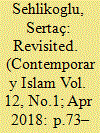

|
|
|
|
|
| Summary/Abstract |
This article locates imaginative aspects of human subjectivity as a feminist issue by reviewing the concept of agency in the genealogy of Muslim and Middle Eastern women in anthropological and ethnographic literature. It suggests that, if feminist scholarship of the Middle East would continue approaching to Muslim women’s agency -as it has been doing for decades-, it should do so as an epistemological question and thus expand the limits of ethnographic and analytical focus beyond the broader systems, such as family, nation, religion, and state. As an example to this proposition, the article then discusses the recent work on aspects of selfhood that escape from the structures, rules, systems, and discursive limits of life but captures imaginations, aspirations, desires, yearnings, and longings.
|
|
|
|
|
|
|
|
|
|
|
|
|
|
|
|
| 13 |
ID:
120085
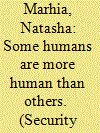

|
|
|
|
|
| Publication |
2013.
|
| Summary/Abstract |
This article develops critical feminist engagement with human security by interrogating the taken-for-granted category of the 'human' therein. Failure to reflectively deconstruct this category has contributed to human security's reproduction of dominant norms and the emptiness of its apparent radical promise. The article shows how the 'human' has historically been constructed as an exclusionary - and fundamentally gendered - category, and examines its construction in human security discourse and the capabilities approach in which the latter is rooted, as well as its discursive effects. The article troubles the model of the autonomous, rational human subject who is the bearer of capabilities, which human security inherits from the liberal humanist tradition of thought, and which obscures the matrices of power through which individuals become socially differentiated. It then considers the implication of human security in demarcating differences as 'morally relevant', including its instrumentalization in the 'war on terror'.
|
|
|
|
|
|
|
|
|
|
|
|
|
|
|
|
| 14 |
ID:
080219
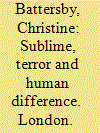

|
|
|
|
|
| Publication |
London, Routledge, 2007.
|
| Description |
x, 226p.
|
| Standard Number |
9780415148115
|
|
|
|
|
|
|
|
|
|
|
|
Copies: C:1/I:0,R:0,Q:0
Circulation
| Accession# | Call# | Current Location | Status | Policy | Location |
| 053048 | 111.85082/BAT 053048 | Main | On Shelf | General | |
|
|
|
|
| 15 |
ID:
164833
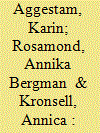

|
|
|
|
|
| Summary/Abstract |
A growing number of states including Canada, Norway and Sweden have adopted gender and feminist-informed approaches to their foreign and security policies. The overarching aim of this article is to advance a theoretical framework that can enable a thoroughgoing study of these developments. Through a feminist lens, we theorise feminist foreign policy arguing that it is, to all intents and purposes, ethical and argue that existing studies of ethical foreign policy and international conduct are by and large gender-blind. We draw upon feminist International Relations (IR) theory and the ethics of care to theorise feminist foreign policy and to advance an ethical framework that builds on a relational ontology, which embraces the stories and lived experiences of women and other marginalised groups at the receiving end of foreign policy conduct. By way of conclusion, the article highlights the novel features of the emergent framework and investigates in what ways it might be useful for future analyses of feminist foreign policy. Moreover, we discuss its potential to generate new forms of theoretical insight, empirical knowledge and policy relevance for the refinement of feminist foreign policy practice.
|
|
|
|
|
|
|
|
|
|
|
|
|
|
|
|
| 16 |
ID:
183705
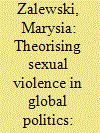

|
|
|
|
|
| Summary/Abstract |
A key curiosity animating this article concerns how sexual violence is theorised. The work of feminist scholars has been crucial in unearthing ways in which women's traditionally demeaned bodies regularly materialised as ‘easy targets’ for such violence. The gift of the concept of gender has played a significant role in facilitating the production of this corpus of knowledge. Less noticed in the literature, in policy and legislation has been sexual violence against men – an egregious omission. Yet it seems that redeploying the concept of gender to make sense of sexual violence against men and elevate this violence into the realms of theoretical and legislative attention is not straightforward. Identifying feminist work as in part responsible for the rendering of sexual violence against men as too ‘unseen’ in theory provoked my attention, though it's not that I place feminist theory as ‘innocent’ or infallible – far from it. In this article I unpack some of the complexities around theorising sexual politics in Global Politics turning towards the aesthetics of feminist thinking to help reconsider the way connections take shape between gender, sex and violence. Underpinning this discussion are questions about feminist intentions to transform patriarchal and colonial structures and institutions.
|
|
|
|
|
|
|
|
|
|
|
|
|
|
|
|
| 17 |
ID:
130909
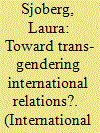

|
|
|
|
|
| Publication |
2012.
|
| Summary/Abstract |
This article engages with trans-theorizing to show how International Relations (IR) is currently blind to gender diversity, and the conceptual contributions trans-theorizing could make. To do so, it asks what insights trans-theorizing might provide for the study of global politics generally, and for feminist theorizing about gender in global politics specifically. After briefly introducing the terminology of trans-theorizing, the article addresses the potential for (and potential hazards of) an alliance between trans-theorizing and feminist theorizing in IR. The article then discusses several potential contributions of trans-theorizing-including hyper- and in-visibility, liminality, crossing, and disidentification-which provide explanatory leverage for IR. The article concludes with some suggestions for further collaboration between trans-theorizing and (feminist) IR to deepen and widen IR's work on gender specifically, and global politics generally.
|
|
|
|
|
|
|
|
|
|
|
|
|
|
|
|
|
|
|
|
|